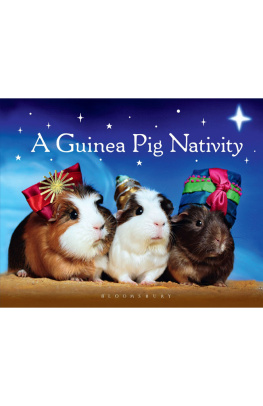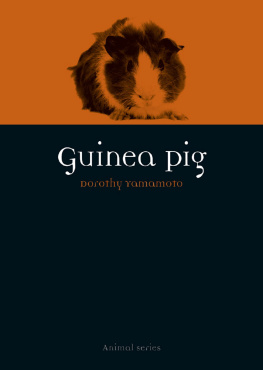Guinea-pigs
Global Issues
General Editors: Bruce Kapferer, Professor of Anthropology, James Cook University and John Gledhill, Professor of Anthropology, Manchester University
This series addresses vital social, political and cultural issues confronting human populations throughout the world. The ultimate aim is to enhance understanding - and, it is hoped, thereby dismantle - hegemonic structures which perpetuate prejudice, violence, racism, religious persecution, sexual discrimination and domination, poverty and many other social ills.
Guinea-pigs
Food, Symbol and Conflict of Knowledge in Ecuador
Eduardo P. Archetti
Translated by
Valentina Napolitano and
Peter Worsley
First published 1997 by Berg Publishers
Published 2020 by Routledge
2 Park Square, Milton Park, Abingdon, Oxon OX14
4RN 605 Third Avenue, New York, NY 10017
Eduardo P. Archetti 1997
Routledge is an imprint of the Taylor & Francis Group, an informa business
All rights reserved. No part of this book may be reprinted or reproduced or utilised in any form or by any electronic, mechanical, or other means, now known or hereafter invented, including photocopying and recording, or in any information storage or retrieval system, without permission in writing from the publishers.
Notice:
Product or corporate names may be trademarks or registered trademarks, and are used only for identification and explanation without intent to infringe.
Library of Congress Cataloging-in-Publication Data
A catalogue record for this book is available from the Library of Congress.
British Library Cataloguing-in-Publication Data
A catalogue record for this book is available from the British Library.
ISBN 13: 978-1-8597-3114-7 (hbk)
Typeset by JS Typesetting, Wellingborough, Northants
for Peter Worsley
This book was published in Spanish five years ago. It was not exclusively written for anthropologists. One of the main aims was to introduce the Ecuadorian urban reader to the complexity of the social and symbolic worlds of guinea-pigs. For urban middle-class Ecuadorians the guinea-pig is simply an edible animal and the peasant knowledge behind it is generally unknown. My intention was to avoid some of the obscurities of anthropological jargon as well as very elaborate discussions of ethnographic findings. When I finished writing it, I felt that the result was not quite satisfactory. In many ways, the book was unnecessarily sophisticated, with too much detail for the lay reader and too little for anthropologists interested in the ethnography of the Andean region. Surprisingly, it was well received by the academic community in general, as well as by the development professionals and agencies and the general public.
The ethnographic description to be found within these pages is a contribution to the anthropology of the guinea-pig in the Andean region of Latin America. A minor topic, some will say. However, the importance of guinea-pigs as food and symbol in this part of the world is undeniable. In the great Cathedral of Cuzco, in Peru, behind the high altar, there is a painting of the Last Supper. Christ is seated with his disciples, partaking, of course, of bread and wine. But the main course in this communion meal is Indian, not Middle Eastern Judaic or Spanish Roman Catholic; the dish in the centre of the table is a cooked guinea-pig. I have not been in all the Cathedrals and churches of Ecuador but I am confident that one can find similar paintings there.
Besides ethnography, some central themes in current theoretical debates in anthropology are touched upon in this book. My interpretation of our findings shows that the impact of global institutions of modernization, state development bureaucracies and rural scientific research corporations is best understood through the observation of local cultural dynamics and sociological variations. The importance of gender, ethnicity and class when different modes of producing and appropriating knowledge are compared is made clear in the text. Globalization forces tend to destabilize the role of locality, impinging on local actors, their power relations and their applied knowledge and contribute to a dominant universality. I contest the common idea of the increasing universalization and the weakening of local knowledges and practices. My findings elucidate the co-existence in Ecuadorian society of different orders, or systems of knowledge. These differences make changes possible; one producer may be perceived as 'national' or 'global' because she adopts the new technology, while others remain local. People can thus move between different frames, being local and/or national according to their chosen practices and the origin of the resources they utilize.
The co-existence of different knowledges and practices is not without tension and conflict. The national state programme of changing 'traditional' guinea-pig production and consumption practice is part of a developmentalist ideology which has achieved an almost 'religious' status in Latin America. Developmentalism is a powerful discourse that, paradoxically enough, in spite of concrete policy implementation failures, is not abandoned or changed. The ideology of development is thus transformed into an ahistoric, rigid and encompassing frame of reference for modern planning agencies. In theory, development deals with problems that need urgent solutions and not with the 'traditional' preferences and practices of local social actors. This book shows both the limitation and the power of such an approach.
I am most grateful, above all, to the Department and Museum of Anthropology, University of Oslo, for their economic support throughout this project, especially during the process of translation. I also wish to thank John Gledhill, editor of the Global Issues Series, for welcoming with enthusiasm and intellectual generosity the project of publication suggested by Peter Worsley. Marit Melhuus, from my Department, and Kathryn Earle of Berg Publishers helped me in finding the present title. Finally, my deepest gratitude to Valentina Napolitano for working with dedication and engagement on the English translation.
Eduardo P. Archetti
This book has taken longer to write than I expected. One reason is that several researchers were involved in collecting the data. Neither the research nor the writing up of the project would have reached completion without the commitment and the intelligence of Martha Freire, Gerardo Fuentealba and Ramiro Moncayo. In the first chapter, these ups and downs are explained in more detail, and help explain the long process of maturation between my original fieldwork, back in 1983; through to a second visit in 1986; and then the editing of a preliminary report - an official publication of the Instituto Nacional de Capacitacin Campesina del Ministerio de Agricultura y Ganadera of Ecuador (Ministry of Agriculture and Animal Husbandry); and, finally, this version, a short book which synthesizes a much greater body of data than is presented here. So it is an unorthodox book. The themes addressed throughout have been discussed on many occasions in my teaching activities at the University of Oslo. Yet I always had the feeling that my argument was somehow unsystematic. For these reasons, I let a lot of water run under the bridge, hoping that time would help to enrich and refine my ideas. But I still may not have been successful. Books are not like good wine.












